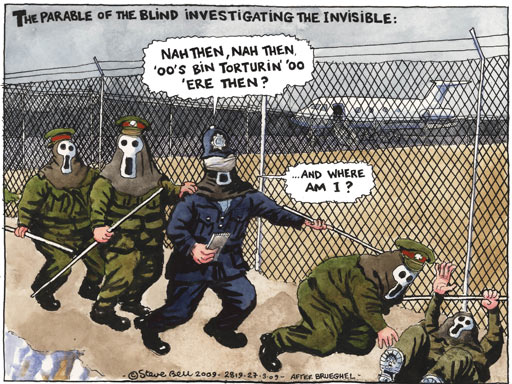Jailhouselawyer v Jonathan Aitken (Round 2)
Nowhere in the so-called independent Centre for Social Justice think tank Report
Locked Up Potential - A strategy for reforming prisons and rehabilitating prisoners, authored by Jonathan Aitken, is there any mention of convicted prisoners human right to vote. This is hardly surprising given that the disgraced former cabinet minister, Jonathan Aitken, is also the author of
Prisoners don't care about their right to vote. Both the Report and the article are as honest as Fagin in Oliver Twist by Charles Dickens. Jonathan Aitken's theme song is
Trust in me...The opening paragraph of Jonathan Aitken's article in the Telegraph states: "Of all the troublesome problems and pressures facing Britain's ever-increasing prison population, the one that led to yesterday's judgement by the European Court of Human Rights on votes for prisoners must rank in importance about as high as tiddlywinks does in the Olympics".
In my view, Jonathan Aitken can rightly be accused of being too flippant as the following reasoned paragraph from
Hirst v UK(No2) judgment shows.
38. On 1 April 1999, in August and another v. Electoral Commission and others (CCT8/99: 1999 (3) SA 1), the Constitutional Court of South Africa considered the application of prisoners for a declaration and orders that the Electoral Commission take measures enabling them and other prisoners to register and vote while in prison. It noted that under the South African Constitution the right of every adult citizen to vote in elections for legislative bodies was set out in unqualified terms and underlined the importance of the right:
"The universality of the franchise is important not only for nationhood and democracy. The vote of each and every citizen is a badge of dignity and personhood.
Quite literally, it says that everybody counts".
Jonathan Aitken's second paragraph states: "The ECHR's advice (and I hope our MPs remember that in constitutional terms it is no more than advice) for the UK Government to give prisoners the right to vote while serving their sentences will no doubt get a full hearing and airing by the chattering classes".
I wonder if the Telegraph paid Jonathan Aitken for this article? If they did they were robbed, and shouldn't he have given the fee to those he still owes £2M in legal fees? According to wikipedia "
He attended Eton College and read law at Christ Church, Oxford". Given that he read law he should be aware of the legal maxim "ignorance of the law is no excuse". His advice, had he given it to me as a lawyer and I had acted upon it I would have sued him for professional negligence, is of course as outdated as his views. The position he refers to changed when the European Convention became incorporated into English law via the Human Rights Act 1998. Prisoners should be grateful that this arrogant twunt did not instead decide to become a prison governor! If he treats the middle classes in such a derogatory manner by calling them the chattering classes pity the poor working class prisoners!
I feel as though I am inflicting a cruel and unusual punishment upon my readers with Jonathan Aitken's next two paragraphs: "But the criminal classes are likely to be less impressed. I can offer some well-informed guesses about how my old cellmates in HMP Belmarsh might react to the news that their Christmas present from Brussels is to be a new right to put their crosses on ballot papers from behind bars.
Indifference, incomprehension or dismissive expletives would be their likely responses. By contrast there would be serious interest in almost anything that improved their prison living conditions or their post-release employment prospects. So it needs to be recognised that this issue is much more about the priorities of European lawyers than the anxieties of British prisoners".
What impresses prisoners are not people like Aitken who can talk the talk, but only if they can also walk the walk.
A small amount of knowledge can cause people to think they are more expert than they really are. In the same way that Aitken would not pick up a lot of learning at Oxford in 7 months, he would not be well-informed in the same period in the penal system. Long-Termers would dismiss his sentence by stating that Aitken was only inside long enough for a shit and a shave. Christmas dinner in prison does tend to include brussels sprouts, but the ECtHR is not in Brussels but is located in Strasbourg. And, even if Jonathan Aitken is confusing the ECtHR with the European Court of Justice, the latter is also not located in Brussels but is in Luxembourg.
Jonathan Aitken is correct in so far as prisoners are seriously interested in those things which improve their living conditions. It follows from this that prisoners rights and their human rights fall into this category of interests. Perhaps, Jonathan Aitken thinks that these just grow on trees and can be picked like apples? Prisoners long before Aitken entered prison fought long and hard to obtain these rights which improved the conditions he so benefitted from during his short stay. Whilst there are European lawyers interested in this issue, the fact that it was British prisoners who were proactive in bring about this case amply displays their concerns and that the priorities are homegrown and not a foreign produce.
Jonathan Aitken's next paragraph: "Let's hope that Parliament will be given the chance to debate and vote on this judgement by the ECHR for it raises moral, practical and constitutional questions that go deeper than the Whitehall establishment's usual reaction to questionable ECHR pronouncements: "We never refuse to write the Court's judgement into UK statute law".
One of my arguments to the ECtHR, which the Court accepted, was the fact that Parliament had not debated the issue before denying convicted prisoners the franchise. I would like nothing more than for Parliament to debate it, but it requires the government to draft a Bill first and so far the government has not been prepared to do this. It is interesting that Jonathan Aitken states that the judgment raises moral questions, in my view it does, or at least should, not. On the other hand, Jonathan Aitken was devoid of morals when he sought to get his 14 year old daughter and wife to lie under oath in court in an attempt to save his skin. It is one thing to commit a crime and quite another to try to drag innocents into his whole sordid affair. The only moral and constitutional questions arise because of the government's refusal to abide by the Court's decision.
I will make this absolutely plain, because the prisoners have the law on their side in this case, they stand firmly on the moral high ground. Because as I have already pointed out in the last paragraph, in my view what Aitken did to his family was morally repugnant, I would advise readers to dismiss his false claim to be an authority on moral arguments. Aitken's next paragraph reads: "The moral argument for ignoring the ECHR's advice starts with the commonsense view that prison is meant to be a punishment. A custodial sentence has always resulted in loss of freedom and loss of democratic rights for the duration of a prisoner's sentence. Why change that? Is there any moral imperative for such a change?".
Firstly, there is not a moral argument for ignoring what isn't the Court's advice because it is in fact a judgment based on sound reasoning. The UK when it ratified the Convention agreed to abide by the Court's decisions. This imposes a moral obligation upon the state to honour this binding agreement. Moreover, it is erroneous to claim that it is a commonsense view that prison is meant to be a punishment. Not since the days when a court used to hand down a sentence of hard labour has prison meant to be a place of punishment. The place of punishment is the court, when a magistrate or judge hands down a sentence. I quote,
Alexander Paterson (1884-1947) Commissioner of Prisons and Director of Convict Prisons. One of his famous statements was that: 'Men are sent to prison
as a punishment, not
for punishment'. Whilst it is true that a custodial sentence results in loss of freedom, that is, physical liberty, English case law
St. Germaine and
Raymond v Honey and indeed European case law
Hirst v UK(No2) "69. In this case, the Court would begin by underlining that prisoners in general continue to enjoy all the fundamental rights and freedoms guaranteed under the Convention save for the right to liberty, where lawfully imposed detention expressly falls within the scope of Article 5 of
the Convention". Therefore, the answer to Aitken's question "Why change that?" is simple, because the law is right and his attitude is wrong. It follows that the answer to his next question "Is there any moral imperative for such a change?" is yes, because legally and morally those who share Aitken's perverse view are equally guilty. It is all very well Aitken asking questions, which I have painstakingly answered, but the $64,000 question "What was he doing in a Paris hotel bedroom with Arabs?", so far Aitken has refused to answer.
Only the last of the next two paragraphs from Aitken needs a response for obvious reasons: " According to John Hirst, the former life sentence prisoner now released on licence who won his case before the ECHR: "The human rights court has agreed with us that the Government's position is wrong – it doesn't matter how heinous the crime, everyone is entitled to have the basic human right to vote".
"The problem here is that what Mr Hirst and the European judges consider a basic human right is the opposite of what many human rights respecting nations including Britain, the United States and Australia, have long considered to be basic common sense".
As we are dealing here with European issues, I fail to see why Aitken mentions America and Australia. As to the first of these, Aitken should thank his lucky stars he wasn't born in a Islamic state and offered a free flight by that infamous airline CIA to the Guantanamo Bay holiday camp in Cuba! Aitken probably thinks that Google is a cricketing term "
Does Australia Violate Human Rights? Yes, it does. The UN Human Rights Committee (UNHRC) has found on several occasions that Australia has breached the fundamental human rights of people living in Australia". As for Britain, it is either first or second in the league table of worst human rights violators in Europe as judged by the ECtHR. And, here lies the problem. Aitken displays that same arrogant attitude held by those responsible for failing to incorporate the Convention into English law 50 years ago. Had we done so, we would not now be 50 years behind Europe in becoming more civilised! I do not see that our shame makes any commonsense at all!
"The main point of a prison sentence is to show the offender and society as a whole that criminal behaviour results in loss of freedom and most of the rights that freedom offers".
I have already answered the above point.
"Different societies may wish to argue about precisely which rights should be suspended along with liberty as the cost to the individual of criminal wrongdoing. But the place for this argument to be held is in national legislatures who even in today's EU still have control over criminal laws and penalties".
This point has already been answered with English case law cited above.
"To pretend that voting is something as "basic" as the right of access to a lawyer is at best special pleading and at worst judicial meddling in the right of EU member states to decide how they will punish their criminal offenders".
The only one pretending here is Aitken with his sword of truth statement when he resigned from his Cabinet post. Article 3 of the First Protocol of the Convention within the HRA 1998 guarantees the right to the vote. What Aitken fails to grasp is that part of being in Europe is being judged by those in Europe! The onus is upon this country to come up to the standard being set or return the country back to the Dark Ages.
"The practical reasons for opposing the legislative changes required by the ECHR judgement will be less obvious to outsiders than insiders. But to give an insight into the problems which could be created for prison officers by this new voting right for prisoners, let us make an imaginary visit to the Isle of Sheppey in the General Election of 2008 where the sitting Labour MP, Derek Wyatt will be defending a majority of 79.
I know one part of Mr Wyatt's electorate all too well, the three prisons on the island – HMPs Swaleside, Elmley and Standford Hill – for I was incarcerated in two of them. Between them these jails currently house 2,224 inmates. They probably make up the biggest single interest group in the constituency.
Will Mr Wyatt and his opposing candidates be allowed to canvass the prisoners, to address them at public meetings and to answer their questions? If not will yet more "basic rights" be infringed in the opinion of the ECHR?
But even if some modicum of common sense prevails, these prison voters will be sure to be highly interested, if not highly excited by the promises they are or are not made by the competing candidates via letter and leaflet.
So spare a thought for the prison officers of Sheppey, who already often struggle in a tinderbox situation to maintain order, calm and discipline. Suddenly they will have to cope with the atmospherics of a marginal seat during the run-up to an election in which every vote counts.
"Getting lairy with the screws" (uppity and argumentative – or worse – with the officers) is already an occupational hazard in the prisons of Sheppey. Charles Dickens' Eatanswill by-election will seem tame by comparison to what might happen among the imprisoned voters of Mr Wyatt's constituency.
It is possible that this imaginary Eatanswill/Sheppey situation that I envisage might be avoided by only allowing prisoners to vote in their own constituencies, although this will be easier said than done because so many prisoners are of "no fixed abode" and others are truly local to their neighbourhood prison.
But whatever the circumstances in whatever the prison voting rights are bound to create tensions, dramas and probably excuses for inmate-to-inmate violence at General Election time.
Unworldly judges sitting in European courts have no idea what life is like at the coalface of Britain's overcrowded prison system so they would probably pooh-pooh the previous paragraphs as exaggerated nonsense. Well, wait and see".
Along with the worldly judges, I too will pooh-pooh Aitke's previous paragraphs.
"But long before that we will have to wait and see what happens in the House of Commons where much Parliamentary time will have to be expended on making legislative sense of this unwelcome Christmas present from the EHCR".
If only it was long before that! On Monday it will be the 5th anniversary of the ECtHR decision, and I am still waiting to see what will happen.
"The Lord Chancellor on The World at One gave a dangerous hostage to fortune when he said yesterday, "Not every convicted prisoner is in the future going to get the right to vote … we need to look and see whether there are any categories that should be given the right".
Indeed, Charles Falconer made a serious error in judgement by speaking out before he had read the Court judgment. It was risky and in my view it is what has caused the government the trouble since because they have become entrenched. Perhaps, the government will take my free and friendly advice? When in a hole, stop digging!
"Oh really? So are we going to have the umpteenth Criminal Justice Bill to categorise one criminal offence after another as qualifying or disqualifying a convicted prisoner for voting? Pull the other one Charlie!".
Whatever. The simple solution is to give all convicted prisoners the vote. The ECtHR has indicated that it would not be a breach of human rights if, say, someone was convicted of electoral fraud and the ban on voting was imposed by a judge on a case by case basis.
"Here's a better idea. The real constitutional issue behind the judgement of the ECHR's is the Court's indefatigable drive for uniformity within the EU. Because some nations in Europe have given their prisoners voting rights, Britain should now do the same, is what the Eurojudges are really saying.
Surely Britain's MPs should exercise their constitutional right and reject the ECHR's advice. Even if it would be the first time it happened that would be one "prison escape" which majority Parliamentary and public opinion would really approve of".
Go back to the drawing board, Jonathan Aitken, it is not advice but a binding decision. The evidence is that public opinion is not supportive breaching other people's human rights. And, how many MPs would get elected if they said vote for me and lose your human rights? If Aitken thinks either I or Europe will put up with Parliament sticking up two fingers to us then I suggest you think again. In the same way that the judgment came from Europe, the penalty will also come from Europe for non compliance.
Time is running out.
The prisoners have the law on their side. Parliament is the lawbreaker here.
Sort it, or else!






















